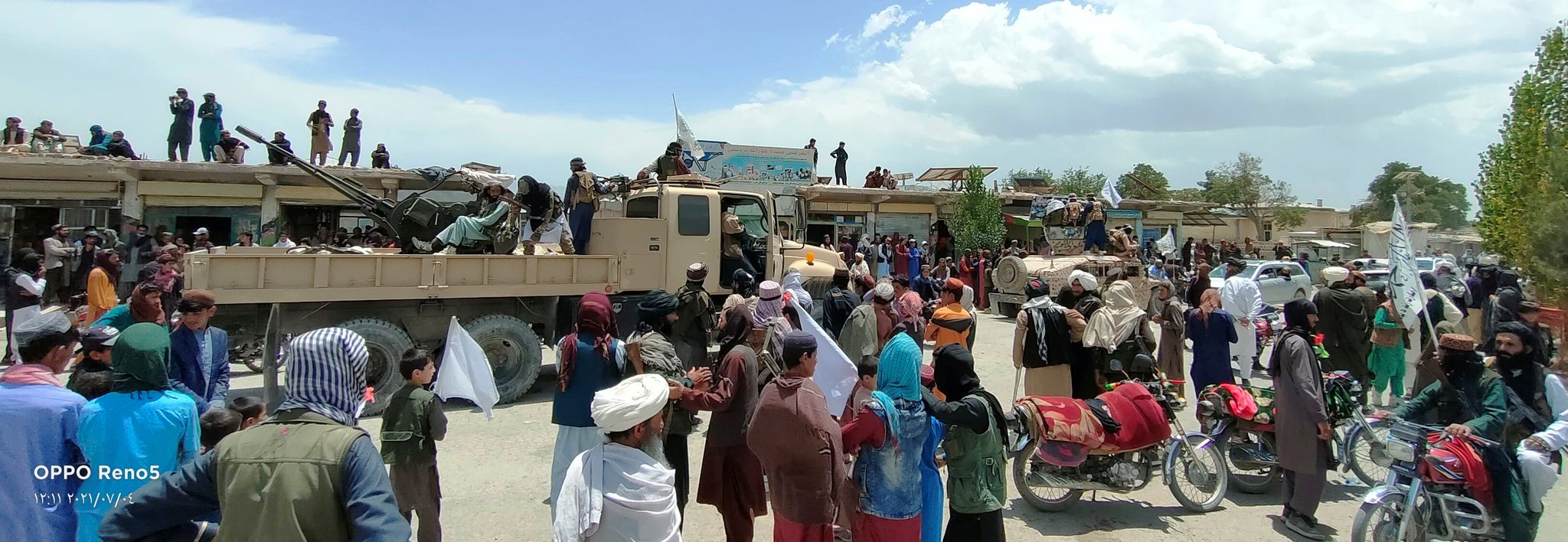by Ajaz Ashraf
When American leaders talk of promoting justice and democracy in the world, the Muslim world hears vengeance and greed

The Taliban and the United States of America share an enduring passion for war and mayhem. There is, though, a difference between them—the Taliban mostly kill people of their own country, America’s victims are largely citizens of other countries.
Some will likely say the US, unlike the Taliban, goes to war to promote democracy and freedom. What they ignore is the chequered record of America’s interference in elections of other countries. It has done so as many 81 times between 1946 and 2000, according to the database of political scientist Dov Lenin. In 59% of these cases, America’s favoured party was voted to power.
America’s interventions have not always been as benign as influencing elections. It has staged coups, assassinated leaders, fought proxy wars and brutalised societies. It would require a book to list them all.
It, therefore, makes sense to limit the survey of America’s depredations only in Muslim countries, given the return of the Taliban to power in Afghanistan and the ensuing fears of Islamic militancy re-emerging.
For an overview, turn to military historian Andrew Bacevich’s piece in The Washington Post, penned after American President Barack Obama ordered the bombing of Syria in 2014. Bacevich wrote, “Syria has become at least the 14th country in the Islamic world that US forces have invaded or occupied or bombed… And that’s just since 1980.”
Bacevich provided a check-list: “Let’s tick them off: Iran (1980, 1987-1988), Libya (1981, 1986, 1989, 2011), Lebanon (1983), Kuwait (1991), Iraq (1991-2011, 2014-), Somalia (1992-1993, 2007-), Bosnia (1995), Saudi Arabia (1991, 1996), Afghanistan (1998, 2001-), Sudan (1998), Kosovo (1999), Yemen (2000, 2002-), Pakistan (2004-) and now Syria. Whew.”

Bacevich’s list is likely to grow in case the Taliban fail to stabilise Afghanistan. This week’s bombing of Kabul airport, in which 13 American marines died, had American President Joe Biden declare that he would hunt down its perpetrators. The hunt will necessarily involve Americans bombing Afghanistan.
Gulf War I
The collapse of the Soviet Union emboldened the US to undertake unilateral military action at any opportunity provided. Such an opportunity was offered by Iraqi President Saddam Hussein’s 1990 invasion of Kuwait. Desperate to augment the state treasury, depleted after an eight-year war with Iran, Hussein invoked history to claim Kuwait had occupied Iraq’s territory, rich in oil.
There was, though, a twist to Hussein’s brinkmanship. It was claimed American Ambassador to Iraq April Glaspie had green-lighted the invasion of Kuwait, suggesting to Hussein that Washington would not take sides in intra-Arab conflicts. Glaspie and American diplomats denied the accusation. This debate revived in 2010-11 after WikiLeaks released American secret diplomatic cables.
Regardless of the truth, the US and its allies relentlessly bombed Iraq, destroying its military and social infrastructure. The ground attack was barbaric. The US Army mounted ploughs on tanks and combat earthmovers to bury alive an estimated 8,000 Iraqi soldiers positioned in trenches, with their legs and arms sticking out.
The Iraqi Army collapsed in a few weeks. It is claimed that around 25,000 soldiers died in the American-led campaign. But worse was to follow in subsequent years. The United Nations Security Council Resolution 661, imposed on Iraq for invading Kuwait, was never withdrawn. Iraq’s revenue from oil was credited to a special account of the UN, which regulated the former’s import of food and medicines.
Several UN officials quit in protest against the harshness of UN sanctions, which continued to increase. Among those who quit was Denis Halliday, who told journalist John Pilger, “I had been instructed to implement a policy that satisfies the definition of genocide: a deliberate policy that had effectively killed well over a million individuals.”
Halliday was not exaggerating—the UN estimated that up to 1.7 million Iraqis may have died by 2003. Of them, 5,00,000 were children. When a TV channel asked Madeline Albright, the US Secretary of State between 1997 and 2001, whether the death of nearly five lakh Iraqi children was worth it, she said, “This is a very hard choice, but we think the price is worth it.”
Does not Albright sound like Al Qaeda’s Osama bin Laden?
Afghanistan
On 11 September 2001, the twin towers of New York’s World Trade Center were bombed and brought down. The Americans demanded that the Taliban hand over Osama. At its refusal, the US-led coalition invaded Afghanistan. The Taliban fled Kabul. They remained on the run until they regrouped to ride into the Capital earlier this month.
Afghanistan was never an Iraq. In 1989, for instance, Iraq had a literacy rate of 95%—and 93% of its population had free access to modern health facilities. But Afghanistan’s suffering was no less than Iraq’s: Around 2,41,000 people were killed in the “Afghanistan and Pakistan war zone” since 2001. Of the dead, 71,000 were civilians. Another 1,00,000 are said to have perished from the indirect consequences of the prolonged war there.
Gulf War II
One reason the Americans failed to stabilise Afghanistan was because President George W Bush and British Prime Minister Tony Blair decided upon regime change in Iraq. Lies were concocted to claim Saddam Hussein possessed weapons of mass destruction.
Journalist David Corn has drawn a list of these lies. For instance, Bush claimed Hussein had a massive stockpile of biological weapons. CIA (Central Intelligence Agency) director George Tenet said, in 2004, that American policymakers knew there was “no specific information on the types or quantities of weapons agents or stockpiles at Baghdad’s disposal.” In December 2002, Bush claimed, “We do not know whether or not [Iraq] has a nuclear weapon.” Tenet Contradicted Bush: “We said that Saddam did not have a nuclear weapon and probably would have been unable to make one until 2007 to 2009.”
National Security Adviser Condoleezza Rice claimed, in 2002, that aluminium tubes purchased by Iraq were “only really suited for nuclear weapons programme.” America’s nuclear experts in the Energy Department had told her it was not likely the case. Vice-President Dick Cheney repeatedly claimed, before Iraq was invaded in 2003, that Mohd Atta, one of the assailants in the 9/11 attack, had met an Iraqi intelligence officer in Prague. The CIA had said the opposite.
Nevertheless, the US-led the “collation of the willing” to bomb Iraq into the 19th century. Hussein was hunted down and hanged. Yet Iraq continued to witness guerrilla attacks on American troops and Iraqi armed forces raised in the years following the invasion. Sectarian clashes multiplied, eventually leading to the emergence of the Islamic State of Iraq and Levant (ISIS).
According to Iraq Body Count, a public database, 2,88,000 people, including combatants, have perished since 2003 till date. In an equal world, Bush and Blair would have been tried for war crimes.
Libya
When the US bombed Hussein’s Iraq into submission, Libyan strongman Muammar Gaddafi repudiated terrorism and ended his missile and nuclear programmes. European countries feted him for his sagacity. But then, in 2011, the “Arab Spring Revolution” inspired Libyans to rise in protest against Gaddafi.
It was time, yet again, for America (and also France) to mull a regime change in Libya.
Spearheaded by Obama, NATO took to pounding Libya and Gaddafi’s forces. Obama was to justify the action later thus: “We had a unique ability to stop the violence [of Gaddafi].”
In 2020, Doug Bandow of the Cato Institute wrote, “In fact, the fears were fraudulent. Gaddafi was no angel, but he hadn’t targeted civilians, and his florid rhetoric, cited by critics, only attacked those who had taken up arms. He even promised amnesty to those who abandoned their weapons.”
Bandow observed that with no civilians to protect, NATO bombed government forces and infrastructure. The country plunged into a civil war, which still continues, not least because the US had not devoted time and energy to put an alternative regime in place.

In 2016, Fox News asked Obama what he thought was his worst mistake of his presidency. Obama replied, “Probably failing to plan for the day after, what I think was the right thing to do, in intervening in Libya.” A strange comment for a Noble peace prize recipient!
In October 2011, in Sirte, Gaddafi was discovered hiding in a culvert. He was beaten, sodomised with a bayonet, shot and killed. When Secretary of State Hillary Clinton was asked about the death of Gaddafi, she said, “We came, we saw, he died.”
It was not Gaddafi who just died. Bandow wrote, “The losers are the Libyan people. The fighting has resulted in thousands of deaths and tens of thousands of refugees. Divisions, even among tribes, are growing. The future looks ever dimmer.”
Syria
One reason Libya plunged into a civil war was Obama’s decision to support Syrians in their uprising against President Bashar al-Assad. By 2012, the CIA took to diverting funds from Libya to arm the anti-Assad forces. Journalist Seymour M Hersh unearthed documents to show that America’s Defence Intelligence Agency had warned that the fall of the “Assad regime would lead to chaos and, potentially, to Syria’s takeover by jihadi extremists, much as was then happening in Libya.”
But then, regime change in Syria had been America’s obsession. Assad had condemned the 9/11 attack, but he also expressed his disapproval of Bush’s war against Iraq. Hersh cited WikiLeaks documents to show that the “Bush administration tried to destabilise Syria and that these efforts continued into the Obama years.”
One of these documents had William Roebuck, then in charge of the US embassy in Damascus, suggesting methods to destabilise the Assad government. Roebuck wanted Washington to work with Saudi Arabia and Egypt to increase sectarian tension in Syria.
So much for democracy!

For sure, the US was not solely responsible for the apocalyptic situation unfolding in Syria. Yet its intervention in Syria, without stabilising Iraq and Libya, testifies to its propensity to bomb and devastate countries whose regimes it opposes. Their people are mere collateral damage.
For the record, the Syrian Observatory for Human Rights says 3,87,111 people have died until December 2020. Another 2,05,300 are said to be missing and presumed dead. About 1,30,00,000 civilians have been displaced.
In 2018, journalist Tom Engelhardt wrote a piece, “The United States is the real extremist country”. That title should be changed to read: The United States is as extreme as the Taliban.
(The writer is a senior journalist. This opinion originally appeared on The Newsclick website and was reproduced with permission.)















